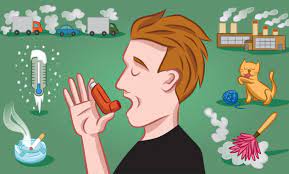Tips for Preventing Asthma Attacks During the Winter Season
Categories: Others

Tips for Preventing Asthma Attacks During the Winter Season
Preventing asthma attacks during the winter season requires a blend of proactive measures and familiarity with expected triggers. Here are a few hints to assist you with dealing with your asthma and decrease the gamble of assaults in chilly climate:
Keep Warm and Layer Up:
Dress comfortably to safeguard yourself from the virus air for preventing asthma attacks during the winter season. Cold air can set off asthma side effects, so wear layers and cover your nose and mouth with a scarf when outside to help humidify and warm the air before it arrives at your lungs.
Stay Indoors During Extreme Cold:
In very chilly climate, particularly in the event that there's a breeze chill, consider remaining inside. Assuming you want to head outside, attempt to restrict the time you spend vulnerable and preventing asthma attacks during the winter season.
Keep up with Indoor Stickiness:
Utilize a humidifier inside to add dampness to the air. Indoor warming frameworks can dry out the air, and keeping up with legitimate dampness levels can assist with forestalling aggravation of the aviation routes.
Regularly Change HVAC Filters:
Guarantee that your warming, ventilation, and cooling (central air) framework channels are spotless and changed routinely to limit indoor air contaminations for preventing asthma attacks during the winter season.
Avoid Wood Smoke:
Wood-burning stoves and fireplaces can release particles and irritants that may trigger asthma symptoms. Ensure proper ventilation if using these appliances or consider using cleaner-burning alternatives for preventing asthma attacks during the winter season.
Get Vaccinated:
Get vaccinated against the flu and pneumonia to reduce the risk of respiratory infections that can exacerbate asthma symptoms.
Practice Good Hand Hygiene:
Clean up consistently to forestall the spread of infections that can cause respiratory diseases.
Manage Stress:
Stress can exacerbate asthma symptoms. Practice stress-reduction techniques such as meditation, deep breathing exercises, or yoga for preventing asthma attacks during the winter season.
Exercise Indoors:
If exercising outdoors in cold weather triggers your asthma, consider indoor activities like using a treadmill, joining a gym, or participating in indoor sports.
Know Your Triggers:
Be aware of your specific asthma triggers and take steps to avoid them. Common triggers can include allergens, smoke, strong odors, and air pollution for preventing asthma attacks during the winter season.
Keep Medications Handy:
Ensure that you have an adequate supply of your asthma medications, including a quick-relief (rescue) inhaler. Keep medications with you at all times, especially during outdoor activities.
Follow Your Asthma Action Plan:
Work with your healthcare provider to create an asthma action plan. Understand the steps to take during different levels of symptom severity and follow the plan consistently.
Regular Check-ups:
Schedule regular check-ups with your healthcare provider to monitor your asthma and adjust your treatment plan as needed.
Remember, individual responses to asthma triggers can vary, so it's important to tailor these tips to your specific needs. If you experience worsening asthma symptoms or have concerns, seek prompt medical attention. Working closely with your healthcare provider and staying vigilant about asthma management can help you enjoy a healthier winter season.